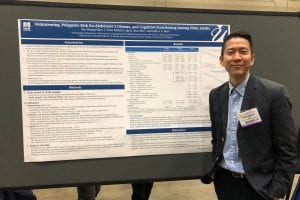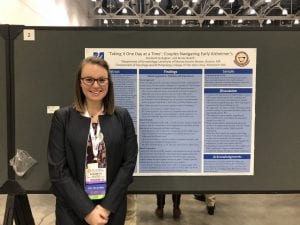By Caitlin Connelly
That’s a lot of research.
UMass Boston’s gerontology faculty and students made 50 paper and poster presentations at the Annual Scientific Meeting of the Gerontological Society of America (GSA) held recently in Boston. The Gerontology Institute Blog asked students about their experiences as presenters at the important national conference.
Sae Hwang Han, a PhD candidate at UMass Boston, already had a handful of presentations under his belt. This year, he presented at the poster sessions and also gave a talk at a symposium.
He found there were advantages to both poster and paper presentations. With the poster, he found, “you actually get to talk to people a lot, they ask good questions and you learn from the interactions.”
Han said the experience of giving a talk in a symposium on a paper can be a more difficult experience but that “makes it more gratifying to go through.”
Celeste Beaulieu, a second-year PhD student, had presented her work elsewhere in the past, but the GSA meeting was her first opportunity to do so at such a large conference.
Beaulieu said presenting was a positive experience and that she found attendees very supportive in conversation about her poster. One of the best parts of the experience, she said, was that attendees suggested future directions for her research, topics that “sound like something I’d be interested in.”
A fellow second-year PhD student, Elizabeth Gallagher, was also presenting at GSA for the first time. She felt her presentation on dementia caregiving took on special significance because many of the attendees who stopped by to view her poster “had personal experiences with Alzheimer’s in their families.”
Each student had their own advice for future student presenters.
Gallagher advised future presenters to “start working on your poster early.” Another tip: “Research something you are passionate about and it never seems like work,” she said.
Words of advice from Beaulieu were to “definitely practice.” She said “if you don’t know something, it’s okay,” emphasizing that conference attendees are supportive.
Han’s advice focused on the research itself: “Try to do the best science that you can,” he said. “With good science, everything is easy.”




Leave a Reply